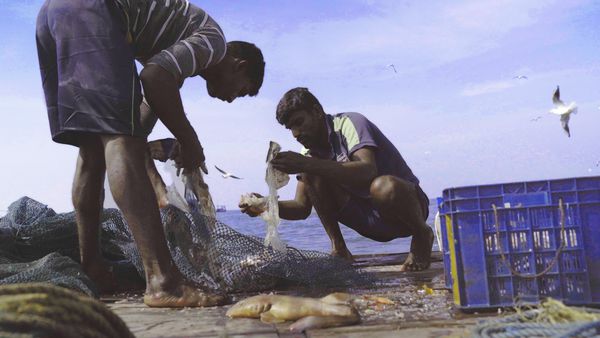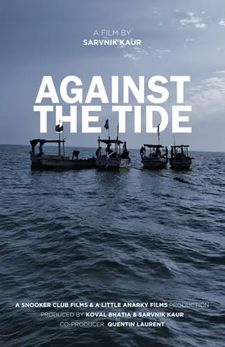 |
| Against The Tide Photo: Courtesy of Snooker Club Films |
In the second part of our interview with Sarvnik Kaur - whose documentary Against The Tide won a Special Jury Prize for vérité filmmaking at Sundance this week - we talk to her about the challenges of maintaining a distance when making documentaries, how she feels about the future for Indian fishermen and look ahead to her future projects. Her film moves between two perspectives to paint a picture of life for traditional Koli fishermen in Mumbai - Ganesh, who has jettisoned historic methods in favour of deep sea fishing and Rakesh, who still plies his trade from a small boat in shallow waters. The situation for Rakesh is further complicated when his newborn child is diagnosed with health problems that the family struggle to afford to treat.
Keeping documentary distance must have been quite difficult sometimes, especially when Rakesh’s baby started to have the health problems - that must have been challenging for you personally especially because you'd known them for such a long time at that stage.
SK: As modern people, we think we're very smart, intelligent, because we have science and we have education. That baby was born at seven months, a premature baby by two months. Rakesh’s family did not have the money to keep him in the incubator like a normal, regular modern child would be kept for two months, they got the baby out within two days. And there is a form of caregiving, and there is a form of natural medicine or way of life, which led this baby to grow into a healthy, regular child. So I am not trying to romanticise anything over here, there were times when getting involved was the only option left for me. When the baby got sick, the baby had to be taken to the hospital and if there are no resources, you find the resources. I was an independent filmmaker, I did not have any resources myself, but that was never going to be something that was going to stop me.
So never forgetting that the wellbeing of the family is central and if everything goes well, this process will continue. I am committed to the process and if I'm committed to the process, I'm committed to the family. So of course, there were very many times when I had to be involved. And very many times when I had to insist, no, this has to be done. But still, at the end of the day, I realised that with all the modern medicine and everything else, when the baby's heart has healed, the hole has become smaller, the modern medicine had very little to do with it. It was the upkeep that was being given to the child by the family.
What do you think can be done to help protect the future of the Koli? Do you think that there is anything that can be done or do you feel very pessimistic about that?
 |
| Koval Bhatia, Against The Tide producer |
SK: It’s a difficult question. I don't really know if it is possible to, to go back in time or stop the onslaught of development. Mumbai is a manmade city that has been reclaimed from the sea. Kolis have always held the coastal belt, which was protected at one point of time by this coastal regulation zone, which said that 100 metres from the high tide point, no construction can be done. Now that 100m has been reduced to 10m, the land is now open for commercial exploitation. Are people like us going to say that no, we don't want sea-facing flats? I don't think so. I myself live in a place which has been reclaimed from the mangroves and a whole residential area has been built around it. So what do I feel about it? I feel like life will find its way to survive and I feel like there is a value system that we've forgotten and that value system comes from a deep satisfaction of knowing that you don't need to struggle so much. You have access to food, it's right over there. It's crazy. I mean, I remember my own upbringing where, you know, my parents would say, learn to be satisfied. I mean, if you're satisfied with what you have, you won't struggle more and it seems like struggle is the way to go forward.
But Rakesh has something radical he taught me - when everyone wants to go forward in life and get bigger, he decides to sell his big boat to buy a smaller boat. To me, that was radical, it was like, how do you have this deep ingrained intelligence in you. It is such an intelligent call that you know, my expenses are too high, I cannot afford this. So to be able to have more profits, I must lower my expenses instead of the other way, which says, behave like a gambler and keep taking bigger loans, a riskier approach. I think that deep-rooted satisfaction comes from the fact that he always says, ‘A Koli man will never die of hunger. We don't need to beg. All I have to do is go wade into deep knee deep water, and I'll find food.’ And that deep-rooted satisfaction is in every aspect of his life.
And so what my modern brain at one point in time used to wonder, does he have no ambition? I have come back with a treasure that he has given to me. You know that ambition is highly overrated. It's the playground for the insecure, who don't have much. Those who are secure, they do not need to struggle every day to live their lives and, and the richer man, for me in that sense of intelligence is definitely Rakesh,
I'd like to recall one interesting incident that had happened about two years ago, Rakesh had come home, and I was telling him I'm sick and tired of filming you fish, I don't know how to shoot it differently. He took my whiteboard marker, and he started to draw on the board. So he drew his boat, bird's eye level, under the sea level. And then he started talking about the currents, the moon, and how it shifts. And it and I was just like you're talking some complex oceanography, you've not gone to school. I mean, you dropped out of school in class three and the world would call you an unlettered man. What I'm hearing is ancestral knowledge. It's like things that have been observed over centuries and passed down to you. And so I think a lot of the Kolis, I think we need to worry about the modern man. I think they'll be fine.
 |
| Against The Tide poster |
Is Ganesh still in the fishing industry?
SK: He is in the fishing industry to the extent that he's working with the government towards changing the policy. He's actually working with a company that works with fishermen. And he's working towards policy because he really deeply cares for his people and for the Koli cause.
The last documentary you did, you were part of a sort of a double directorial team and this time you were on your own. Did that make a difference? Perhaps it had challenges to suddenly be the only one but on the other hand, I guess you get more freedom that way.
SK: It was both liberating and freeing, and I think, good for my own personal growth in a lot of ways. Firstly, the first documentary and subject matter that I did, I don't know when I look back at it if I was the right person to have done that film. An Indian mainlander making a film on Kashmir. I feel very conflicted about it in retrospect. And if I wasn't as naïve and young as I was, when I was making that film, I don't think I'd make that mistake again. And secondly, I feel like when you're not with someone, you can be your honest, vulnerable self at all points of time. That's one value system that I would like to take forward with me. I think, as a woman, life is hard enough, I was looking for the world to show me its value that it stands by its value. And now as a woman director, I feel like I will put that value on the table and the world will respond to it. And that is a big, big difference that has happened from a duo to a single director..
So it’s given you more confidence to do the things that you want to do and shape stories in the way that you want to tell them?
SK: Absolutely, I think, to a large degree, all of capitalism, masculinity, patriarchy, the way it works, instils a lot of fear in you. Having worked alone, I think I've kind of got a grip on that. Hope is as futile as fear. Fear doesn't serve you well. Hope doesn't serve you well. Be in the moment. Give your truth. Tell your truth to whoever would listen, if they don't care about it, move on. It's taken five years, the next one can take 10, I'm game for it. But I've learned some important lessons and I found a treasure trove. Don't be scared. I think that fear has been mostly worked out of my system. Of course, I paid for it with blood and tears.
Are you already working on other projects?
SK: I have. I have started research on my next project. I also want to take this year to reflect on the work that I've done and how it is perceived and I want to talk about it. I want to talk about this fear that we all live with constantly and I want to be able to engage with the audiences and see at what level the film resonates with them. And as far as the next project is concerned, I think I like to work slowly. I don't like to be on the treadmill. So I have started talking to people. This trust-building exercise for me is the biggest part of documentary. I like my approach of being slow, of letting us together figure out what it is that we are trying to tell rather than me having some deep intelligence over the people that I am putting my cameras on. So I want to take that time. Yes, I do have a project that I'm thinking of and I've started research. I have found one character but I do want to talk about it too much right now because I don't have the consent yet.
Read the first part of our interview with Sarvnik Kaur





















